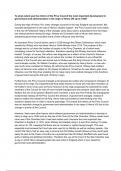To what extent was the reform of the Privy Council the most important development in
government and administration in the reign of Henry VIII up to 1540?
During the reign of Henry VIII, many changes occurred in the way England was governed, this
included development in the role of Henry's closest support - the Privy Council and more widely
in the role of Parliament. Many of the changes came about due to propositions from the King’s
two closest advisors during his reign: Wolsey and Cromwell, both of whom were keen to
streamline government and allow more of their influence onto the King.
An important Privy Council reform came in 1526 through the Eltham Ordinances, which were
enacted by Wolsey who had been Henry’s Chief Minister since 1515. The purpose of this
change was to cut down the number of people in the Privy Chamber, all of whom were
competing voices for the King’s attention, therefore meaning that Wolsey had more influence
himself. Though, of course, this reform was disguised as a reform of the Council’s finances -
reducing costs was just another way to reduce the number of members A very influential
member of the Council who was forced out by Wolsey was the King’s Groom of the Stool, his
most intimate courtier, Sir William Compton, who was replaced by Henry Norris - a man who
was much more compliant to Wolsey. By reforming the Privy Council, Wolsey had enabled
Henry to become more reliant on his closest ministers ie. himself so he was able to gain more
influence over the King thus enabling him to make many more radical changes to the functions
of government during the first part of Henry's reign.
Furthermore, the Privy Council changed a lot because the nobles who composed it changed. At
the start of his reign, the inexperienced King relied heavily on those who had been members of
his Father’s inner circle such as Heron however as his reign progressed he switched the noble
members of the Council for men of more humble backgrounds who became close allies such as
Wolsey, the son of an Ipswich bButcher and Cromwell, a poor boy from Putney. By changing the
fundamental makeup of the Privy Council the direction of government changed, instead of
jealous nobles who wanted to be King, Henry was surrounded by hard working men who
wanted to please him in order to receive patronage. This meant that reform of the Privy Council
was an important change to government and administration in the reign of Henry VIII due to the
change in priority of the Council.
However, there were other factors which allowed government and administration to develop in
Henry’s reign up to 1540 such as the use of the Court of the Star Chamber. Wolsey made much
more use of the Chamber than it had been before and it became the most important law
Chamber in England. In 1516, when Wolsey had started using it, it went from seeing 12 cases
per annum to 120, meaning that there was an increase in Justice being brought. This was
especially true because the Court was also used to try Nobility as well as ordinary people - this
meant that Henry had an easy way to ensure that his Nobles would behave as they could quite
easily be sent to the Tower of London as a punishment like Sir Robert Sheffield who was found
guilty of aiding and abetting homicides. Therefore the use of the Court of the Star Chamber was
a way in which Henry allowed greater law and order in England which in turn eased his
government and administration.





